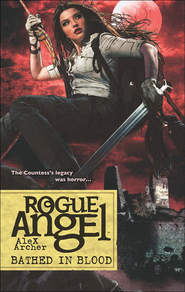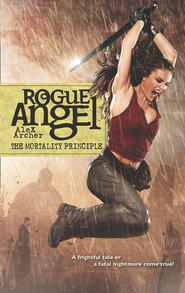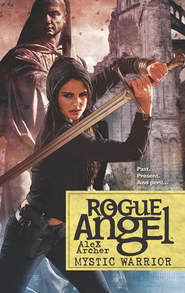По всем вопросам обращайтесь на: info@litportal.ru
(©) 2003-2025.
✖
Day Of Atonement
Автор
Год написания книги
2019
Настройки чтения
Размер шрифта
Высота строк
Поля
“I’m not sure I’d call making up some fanciful story anything more than irresponsible, Mr. Moerlen. It certainly isn’t journalism.”
The reporter inclined his head slightly, as though conceding the point. “I’m going to be in Paris for a couple of days. Think about it. I’ll leave these copies of the photographs with you so you can go through them at your leisure. I do hope you will decide that you’d like to talk to me about this miracle, Mr. Roux. You have my number.”
The man got to his feet and held out his hand.
Reluctantly, Roux shook it.
The more he made of the situation, the harder it would be to brush it aside as some bizarre flight of fancy. People didn’t live forever. It was impossible. But then, so much about his life was impossible. He needed time to think about this. It would be easy to pull a few strings and make sure that the story was squashed before there was any danger of it being printed. No one made it to Roux’s age without collecting an awful lot of favors owed in the checks and balances of life. It helped that the story sounded utterly preposterous.
He stood at the front door and watched as the young man drove away in the small Fiat, white crystals of fog gathering in the night. He could taste snow on the breeze. Maybe not tonight, or tomorrow, but soon, Roux thought. He usually liked this time of year because it was all about the end of things, something he’d experienced so much without having faced it himself.
As the fog folded around the journalist’s car, Roux made his way to his study and started to make the calls.
2 (#ulink_6f1fa99d-120b-5434-917c-0bcb2971e8ff)
“You absolute bastard!”
Roux had ignored Moerlen’s calls and, when they finally appeared to stop, assumed he’d gotten the message: there wasn’t a serious magazine or newspaper in the world that would touch the story. A few of the editors had humored Moerlen and admitted that yes, it was curious, wasn’t it? But curious or not, it wasn’t for them. A few that Roux knew personally had laughed in the young man’s face.
Roux said nothing.
Instead, he allowed the journalist to vent his frustration over the phone. He was doing the man a favor, even if he didn’t appreciate it. By letting him get it out of his system it minimized the chances of him doing something stupid. Sooner or later Moerlen would find some small circulation magazine that liked the unexplained and unexplainable, which would buy the story and might even run it, but no one took that kind of nonsense seriously.
“It’s not going to work. You can’t gag me, no matter who you know. I’ll find someone who will publish this story. The truth will come out.”
“Look,” Roux said patiently. “I don’t know what you think you know, but believe me, you don’t. There is no story to sell. Let it go. Get on with your life. Don’t make an enemy of me, son,” Roux said, deliberately patronizing the man on the other end of the line.
“You think you are so clever, don’t you? You think that you have it all worked out. What you don’t get is that the whole world will want to know your story. How can someone live for so long without aging? I’m not naive enough to think you signed some kind of pact with the devil, but something is going on. That is you in those photographs. I know it is. I’ll prove it.”
“I’m sorry that you’ve wasted time on this,” Roux said, signaling an end to the conversation, but the man refused to go.
“Fine. I’ll begin my story by telling everyone how I’ve been muzzled. That makes for a compelling beginning. How someone—you—didn’t want this story out in the public domain. That just makes it more interesting, doesn’t it? Think about it. The fact that the truth is being suppressed is more interesting than the truth itself. Why would you want this kept secret unless you had something to hide? You can try to ridicule me and make me look like a fool, but I won’t be silenced. There are other ways to tell this story. This is the modern world now. Information wants to be free. There are bulletin boards and chat rooms that would devour this type of thing, giving it a life of its own. All I have to do is log in and start to tell the world everything I know. It’s not about money anymore. It’s about the truth. You’ve misjudged me, Mr. Roux, if you think that all I care about is money. I didn’t turn up on your doorstep trying to blackmail you. I came looking for answers.”
“And that was a mistake,” Roux said, then hung up.
Moerlen was right; the world was changing, and changing faster than it had for decades before. It was already smaller than it had been even twenty years ago with the pernicious invasion of television, but now with so many people having access to computers and those machines somehow connecting like some giant message network, it was so much more dangerous for a man like him.
This was escalating too quickly. The risk now was that it would slip out of his control. There were strings he could pull, more favors he could call in, but once the story had a life of its own there was no way he could put that genie back in the bottle. And that was what those bulletin boards and chat rooms promised to do.
Which meant he had to find another way to stop the story.
He needed to speak to someone who understood this electronic world, and the very real damage that could be done if he were to be exposed. There was one obvious choice, but given that they hadn’t talked for longer than Moerlen had been alive, it wasn’t exactly an easy call to make. The last time they’d been together Garin Braden had tried to kill him. The same thing had happened the time before. A third time and he’d start to take it personally.
He dialed the number, but he was forwarded straight to voice mail.
“Call me,” he said, then hung up.
There was nothing more to say.
Garin—his former pupil—would recognize his voice, and understand just how important it was that they talk simply because he’d swallowed his pride and reached out.
He thought about ignoring the situation and hoping the mess would just go away. The more he fought against it, the more obvious it was he had something to hide, after all. But what if it didn’t go away? What if those damned photographs led to more journalists banging on his door, asking more and more questions he couldn’t answer? He hadn’t asked for this life, even if, looking around him at the riches he had assembled across the centuries, it might look like a blessing rather than a curse. All it would take was the wrong person digging deep enough and everything would begin to unravel. The last thing he wanted to do was to have to begin a new life somewhere else. It was getting harder and harder to do that in this era of powerful computers and international cooperation.
His world, and Garin’s, was in danger of falling apart.
He punched a number on his phone again.
“Mr. Moerlen,” he said before the man on the other end of the line had had a chance to say hello. “You are right, we should meet. I will be in Paris in a couple of hours.”
“I’m so glad you’ve come to your senses, Mr. Roux. But things have changed since the last time we spoke.”
“How so?” Roux asked, not liking the sound of this.
“Remuneration, Mr. Roux.”
“Ah, so despite all of your protestations, this is about money, then? I’m disappointed.”
“Don’t be. I’m a child of the modern age. The modern age, as I’m sure you have noticed, is an expensive place to live. Let’s make it the top of the Eiffel Tower shall we?”
Moerlen named a time and hung up.
Roux wondered how much this was going to cost him. It wasn’t that he didn’t have the money. He had plenty of money, but would it ever be enough to guarantee his privacy? Pay the blackmailer once and then what? Expect him to be good for his word and never turn up on the doorstep again looking for another handout? Blackmail was a dirty business. There could never be an end to it.
Which, unfortunately for Moerlen, meant it needed to end very differently.
* * *
IT WAS A long climb.
There were a dozen tourists already on the viewing platform by the time Roux reached it.
There was no sign of Patrice Moerlen.
Roux’s plane had been refueled and would be ready to leave Orly Airport at a moment’s notice if things went the way he assumed they would. He would need to distance himself from the city for a while. A glance at his watch, an eerily precise Patek Philippe chronograph, showed that he was almost five minutes early. He hated to be early for anything; time spent waiting around was time wasted. Perhaps it was because he had so much of it he hoarded it?
A couple of tourists glanced in his direction, no doubt wondering why he had made the dizzying climb up the iron stairs and wasn’t leaning over the rail to take in the view across the city.
“Are you afraid of heights?” a small boy with a thick American accent asked him. “You can’t fall out you know. You’d have to climb and jump because of the railings, so it’s really safe.”
Roux forced a smile.
“That’s good to know.”
The boy’s mother took hold of his arm and pulled him away, muttering something about not talking to strangers.
Roux checked his watch again. Ninety seconds. Still no sign of Moerlen. And no sign of him on the stairs below, working his way up to the platform. This wasn’t good. He couldn’t control the situation. He didn’t like it when he couldn’t control the situation. The elevator doors opened behind him.
Another handful of tourists emerged, but the journalist wasn’t among them.











